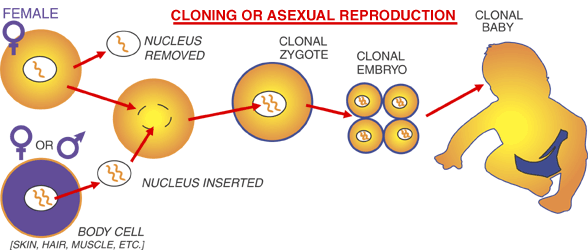Human reproductive
cloning is when you create an individual to be identical to someone that exists.
There DNA is the same as the other person. Everything from their looks to their
personality is exactly like that person. Human reproductive cloning is done by
somatic cell nuclear transfer. Somatic cell nuclear transfer is putting the
nucleus of a body cell into an egg from which the nucleus has been removed. This
produces an embryo from which is triggered to begin developing with chemicals,
and then placing this cloned embryo into the uterus of a female and bringing it
to term creates a clone that has the same identical genes as the other person. 

This topic is
very debatable topic. Most people favor it and think it has a lot of benefits
while some people disapprove of it. There are advantages and disadvantages of
human reproductive cloning. The advantages are 1) eliminates defective genes –
as more humans reproduce damage to the DNA line increases which mutations and
defective genes occur, which leads to more deaths but this can be prevented
through the cloning of healthy human cells. 2) helps homosexuals have babies –
cloning will allow lesbians to have babies without using donor sperm and for
men to have a child that doesn’t have genes coming from an egg donor. 3) allows
parents to seek redress for their loss – cloning can help bring someone back
into life but if a different body. The disavantages are 1) high failure rate –
over 95% of human cloning have resulted in failure. 2) faster aging – this will
lead to premature aging which will shorten the lifespan of the clone. 3) lose
human diversity – making people look identical everyone will start looking the
same and behave the same. This will lower the uniqueness and the overall value
of life. Human reproductive cloning can be the savior of us or it could be the
bane of our existence.
In the book “The
case against perfection” it talks about cloning and how in 2001, the House of
Representatives passed a bill to banned cloning, not only human but also
biomedical research. The bill didn’t become a law because the Senate supports
stem cell research. So now there is no federal law in the United States against
human reproductive cloning.
I agree, the prospect of human reproductive cloning is ominous and the whole issue threatens our sense of the sanctity of individual life.
ReplyDeleteBut I don't agree that it would necessarily destroy individuality and personal uniqueness, which has at least as much to do with experience and variable environmental interactions as with genetics. Two genetically-identical individuals who've lived different lives in different places will undoubtedly have made many similar choices, but the total imprint of experience will surely be significantly different for them in many respects. Time will tell, unless every nation bans the practice (and enforces the ban).